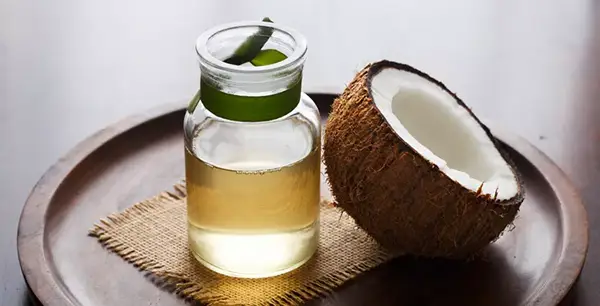Coconut oil offers numerous advantages for both hair and scalp care. It helps soothe dandruff, revive shine in dry or damaged hair, control frizz, and shield hair from styling damage. Plus, it’s gentle and effective for all hair types. Coconut Oil Secrets You Need to Know for your hair care!
Coconut Oil Benefits
Coconut oil is packed with lauric acid, a type of saturated fat that can help protect your hair from protein loss and damage caused by dyes, bleach, and shampoos. Many people find that using coconut oil on their hair helps reduce its dullness and makes it less fragile.
Applying coconut oil topically can also help hydrate your scalp, which is great for those looking to prevent dandruff and promote hair growth. In my experience, the antifungal properties of coconut oil provide real benefits for people dealing with dandruff, making it a valuable addition to any hair care routine.
Research shows that the rich compounds in coconut oil support healthier hair, making it a must-have for anyone looking to boost their hair health naturally.
Coconut Oil for Damaged Hair
Coconut oil can be a game-changer for damaged hair. A 2022 study showed that coconut-based hair oils (also called CBHOs) effectively reduced damage to human hair caused by routine washing. The researchers found that these oils work through a mechanistic or physical process that helps in reducing damage.
In a follow-up 2024 study, it was revealed that coconut oil, along with other vegetable oils, contains triglycerides that can penetrate the hair cortex. This means that coconut oil can limit the amount of water absorbed, helping to control everyday hair damage. Personally, I’ve noticed that using coconut oil not only makes my hair feel softer but also helps protect it from daily wear and tear.
Dry Scalp, Dandruff
If you’re dealing with a dry scalp or dandruff, coconut oil can be a helpful solution. A 2021 study in India involving 140 people found that topical applications of coconut oil had great antifungal benefits. The researchers noted that coconut oil could fight scalp yeast infections while promoting the growth of beneficial bacteria.
This helps reduce flaking, making your scalp healthier overall. I’ve personally experienced how coconut oil not only soothes an itchy scalp but also helps repair the skin barrier, which is the top layer of our skin.
With its anti-inflammatory properties, coconut oil can improve the overall condition of your scalp and even boost the production of collagen, a vital structural protein in our skin and tissues.
Ways To Use Coconut Oil as Hair Care
Coconut oil stands out as one of the most versatile oils for hair care, known for its ability to revitalize dry, damaged, or color-treated hair across all hair types. You can easily add it to your routine in several ways, such as:
- Prewash Protector
Coconut oil is a fantastic prewash protector that can help prevent your hair from soaking up too much water before shampooing, which can stave off damage and dryness. Just apply it to your hair for 15 to 30 minutes before washing, focusing on the midsection and ends. - Conditioner
It also works great as a conditioner; you can use it to strengthen the hair shaft and help prevent breakage. Simply add a few drops to your usual conditioner for added benefits. - Styling Aid
If you want to tame frizz, use a small amount of coconut oil as a styling aid on damp hair for better absorption. - Hair Mask
For a super-nourishing treatment, massage a teaspoon of coconut oil through your hair, leave it on overnight, and wash it out in the morning. - Sun Protection
Finally, coconut oil provides some sun protection against ultraviolet light exposure, although more research is needed to confirm its effectiveness.
I’ve found that incorporating coconut oil in these ways has transformed my hair, making it healthier and more manageable.
How Often to Use Coconut Oil for Hair
One of my favorite ways to use coconut oil is as an overnight leave-in treatment. It really helps to nourish and condition dehydrated locks. According to Fitzsimons, you can apply a coconut oil mask by using a small amount and ensuring even distribution throughout your hair and scalp. Leave it on overnight and then rinse it out in the morning.
For best results, repeat this process weekly for strong, hydrated hair. A pro tip to keep your sheets clean is to use a shower cap while masking, as coconut oil can stain fabric. Additionally, a research study showed that hair treated with coconut oil is more protective against breakage than hair not treated.
Haircare experts recommend using coconut oil a few times per week, but the frequency may depend on your hair type; those with finer hair might want to use it less often.
Tips for Using Coconut Oil Effectively

To make the most of using coconut oil in your hair care regimen:
- To use coconut oil effectively, start by warming it before applying. You can melt solidified oil by putting a teaspoon into a cup and placing it in a bowl of hot tap water, or you can rub it between your hands. Avoid using the microwave as it can lead to dangerous overheating.
- For added benefits, consider making a blend with essential oils like lavender or peppermint, along with hair-nourishing natural ingredients such as yogurt, honey, or avocado.
- It’s best to apply coconut oil at night to allow it to absorb without making your hair look greasy in the morning; just shampoo it out the next day.
- When using it, remember to apply lightly; a small amount (around a teaspoon) is enough, especially if you have thick hair, so massage it into the midsection and ends.
- Be cautious with your scalp; while coconut oil can help with dryness and dandruff, using a small amount in a small area first can help you test for any skin reaction.
- When you’re ready to remove the oil, consider a second shampoo to completely eliminate slickness.
- Lastly, if you have coarse hair, rotating coconut oil with other oils like argan, avocado, or castor can prevent hair stiffness from repeated use.
Disadvantages of Coconut Oil for Hair
Using coconut oil for hair can have a few disadvantages:
- Allergic reactions: Some people may experience an allergy to coconut itself.
- Cannot heal serious scalp conditions: While coconut oil has anti-bacterial properties, it can’t cure serious issues like psoriasis or dandruff; it’s best as a useful add-on to medicated treatments.
- Coconut oil can weigh hair down: For those with fine hair, it can make hair look limp, flat, or greasy.
- Overuse can make coarse hair stiff: Using too much can lead to stiffness, so it’s smart to rotate its use with other oils to avoid buildup.
- Clogged pores: Applying coconut oil can lead to clogged pores on the scalp, so it’s wise to do a skin test before use to check for any skin reactions.
Selecting the Right Coconut Oil
When shopping for the best coconut oil for your hair, look for the unrefined variety, also known as virgin oil or extra-virgin oil. Choosing organic and sustainably harvested options is important for quality.
Cold-pressed products are a good choice because they avoid using heat or chemicals in the extraction process, which keeps more nutrients intact.
Some reliable brands include The Garden of Life Raw Extra Virgin Coconut Oil and Dr. Bronner’s Organic Virgin Coconut Oil. Check the labels for symbols that guarantee high-quality oil, like Fair Trade Certified or non-GMO verified seals, ensuring you get the best for your hair health.
Quick Overview of Coconut Oil Benefits
Coconut oil can moisturize and repair damaged hair, making it a great choice for those with dandruff or other scalp conditions. You can use it as a prewash treatment, conditioner, hair mask, or styling aid to get the best results.
Start by applying a small amount to see how your skin reacts; if you like the results and have no problems, you can use the oil one to three times weekly.
Remember, a little coconut oil goes a long way, so use just a teaspoon, focusing on your hair’s midsection to the ends. For the best results, choose unrefined coconut oil.


1 thought on “Coconut Oil Secrets You Need to Know For Your Hair Care!”